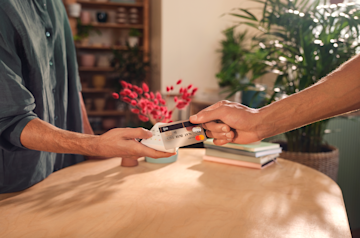
Planning your moving day: a complete guide and checklist
Moving doesn’t have to be a nightmare — it just might take some advance planning. This guide and checklist can help make it easier.
13 min read
Finally! You've found the perfect apartment and can't wait to settle in. Now, if only you didn’t have to deal with moving out of the old place... No doubt about it: Moving can be nerve-wracking. When should you start packing, and what do you pack first? How many moving boxes do you need? Can you get help from family and friends, or do you have to hire a company? And how much is all of this going to cost? If questions like these are plaguing you already, don’t panic! That's why we created this guide to help you plan your move. Here, you’ll learn the best time to move, which preparations you can do in advance, and what surprises you might encounter on your moving day. You'll also get a complete moving checklist and more handy tips to ensure your move goes as smoothly as possible. Let’s go!The process of looking for an apartment can be very unpredictable, since some of the factors are out of your control. You never know when you’ll suddenly find the perfect place — and when you’ll be the lucky applicant to actually get the apartment. But even while you hunt, you can already do a lot of preliminary work, like cleaning out your room, apartment, or basement. This way, you’ll make good use of the waiting time until moving day. Plus, you can save a lot of time and money — and maybe even make some extra cash. Sort out things that you don’t need anymore — like clothes, kitchen gadgets, or kids’ stuff — and sell them online or at a flea market. You can use the money to increase your moving budget or save it for that new couch you’ve been eying. Then donate, give away, or recycle whatever you can’t sell — it’s better for the environment, and sometimes one person’s trash is another person’s treasure!So, you finally got your dream place? Then you can start packing immediately, right? Not quite! First, you should take care of these not-particularly-exciting but extremely important things:You’ve already made huge strides. Here are more important tips and practical tools to make your move as smooth as possible:Moving takes money and brainpower. Luckily, there are many helpful financial planning tools for relocating. You can use our moving cost calculator to determine how much money you should put aside. Then create a sub-account with Spaces and simply drag and drop the amount to set it aside. Use other innovative features like Rules and Round-Ups to automatically save a little extra for your move — like for a quick mid-move coffee break or takeout lunch.If you’re trying to juggle planning a move with other demands, such as studies or a full-time job, a digital assistant can be a huge lifesaver. There are a number of apps available on Google Play and the App Store, including:Rule number one: Never pack boxes to their full capacity, otherwise they can get too heavy. You should be able to comfortably slide your fingers into the handles. In the middle of moving day, nothing is more annoying than boxes that rip open or are hard to hold! Standard boxes measuring 61 x 30 x 32 cm (L x W x H) have a maximum load limit of 40 kg, but 20 kg per box is recommended. If you want to make the most of the space, you can fill the top half of the box with light, soft things like a pillow or tea towels.Books should be stacked vertically so that the corners don’t get damaged during transport. You should also plan your move thoughtfully and pack things first that you won't need in the next few weeks — then pack everything else. Labeling the boxes is also particularly important. Clearly mark what each box contains, like "Books," "Clothes," "Toiletries," etc. and the rooms such as "Kitchen," "Bedroom," "Hallway," or "Basement." This way, you can move each box straight to where it needs to go and avoid searching for missing items. Write "Fragile" on boxes that contain breakables. It’s a good idea to use painter's tape or masking tape so you don't have to write directly on the boxes — this will make them easier to sell once you’re done moving.If you’re doing the move yourself with friends, you’ll need some supplies. For example, you can rent a dolly at a hardware store to transport heavy furniture, boxes of books, and larger equipment. Work gloves protect against splinters and help you keep a grip on your valuables, while straps with ratchets and hooks keep your things securely in place in the moving van. And fleece blankets or towels can help to protect delicate edges, mirrors, and glass. Ask around if anyone you know can lend items like these so that you can save a bit of money.Hopefully, your moving day will be smooth sailing — but it’s still good to be prepared for the worst. Put together a first-aid kid with pre-cut band-aids, sterile tweezers, and wound spray for splinters. And when lifting heavy items, remember: Never lift from a standing position! Instead, squat down to protect your back.Your moving team will be hungry and thirsty after all that hard work. Prepare sandwiches for the big day and use companies like Gorillas to get crates of drinks delivered. Bananas are also great snacks for between meals. Alternatively, you can order pizza — there are even vegan and gluten-free options if your moving crew have any dietary restrictions. If you want to provide plates, cutlery, and mugs, use eco-friendly alternatives made from cardboard or cornstarch. Instead of napkins, you can buy recycled paper towels. Also have a few garbage bags ready so you can clean everything up quickly.Your driver’s license is stuck in some random moving box? No idea where your fresh underwear and laptop charger are? You’ll make your life much easier if you keep the most important things handy on the big day and for your first morning in your new place. It's worth packing like you would for a short vacation. Keep everything you need in a fanny pack or small bag: your keys for the old and new apartments; your wallet with your driver’s license, identity card, insurance card, and bank card; your phone, charging cable, and power bank; and some band-aids. Pack a few important toiletries — like your toothbrush, contact lens solution, toilet paper, a towel, etc. — in a backpack or small suitcase along with fresh clothes and your laptop and charger. Organizing and moving everything is tiring, so keep your bedding handy in a large tote bag or laundry basket. That way, it’ll be easy to find on your first night.One final tip to make your move less stressful: Be considerate of your neighbors, both new and old. Post a note in the hallway to let them know about your move and apologize for any inconvenience or disturbance. You could even go around your new building or neighborhood and give your new neighbors cookies or flowers — you’ll also make a few contacts right away. This can be especially helpful if you move to a new city and don't know anyone. Who knows what kind of friendships might develop!This checklist will help you to keep track of your move. Customize it to suit your situation, then print it out or save it as a note on your phone so that you have it whenever you need.Three months is a good benchmark for how far in advance you should plan your move. It also depends on where you’re going. Are you moving to Munich to study or just to another part of your city? Are you planning to move to another country or to immigrate to Germany from abroad? The distance and logistics can affect how much time you’ll need to spend planning. When you start looking for an apartment and planning your move, if possible, you should also check when the best time is to move.In most parts of Germany, spring is the best time of year to move. It’s often hot in the summer, the fall can be rainy, and snow, ice, and slippery roads in the winter can make the whole moving process harder. In the spring, the temperatures are generally mild and the prices for moving companies or rental cars are often cheaper than in summer. You can save even more money during the Christmas season. Most people don’t move at this time of year — maybe because they’re already thinking about their holidays or New Year's resolutions.Avoid booking your move on a weekday or holiday, if possible. Saturday is the most popular moving day in Germany because many people have the day off work, but businesses are still open. If you choose to move on a Saturday, though, you might have a harder time hiring a company or renting a vehicle. Sunday can be a good alternative. Note, however, that many moving companies charge extra on Sundays.When the move is finally done, you can throw yourself fully into your new life. Looking for tips for life in Hamburg or inspiration for Frankfurt? Or wondering how you can save energy and reduce your daily water consumption? On our blog, you’ll find many more helpful articles about saving, financial planning, and much more.
How do I plan my move?
What do you have to do before moving?
- Cancel your current rental agreement: If you have a rental agreement for your current apartment, cancel it as soon as you and your new landlord sign the contract for your new place. Depending on the notice period, you may or may not be able to avoid paying double rent. Either way, the sooner you cancel your current apartment, the more money you’ll save. If your current landlord is flexible, they might let you out of the contract a bit earlier. Also make an appointment for the apartment inspection and key handover as soon as possible.
- Choose your moving date: The move-in date specified in your new rental agreement doesn’t necessarily have to be your moving date. This is simply the date when your contract starts. If you don’t need to move out of your old place right away, you can take your time preparing everything in your new home, such as buying furniture or installing light fixtures. Below, we share more tips for choosing the right moving date and time.
- Book an appointment at the Citizens’ Registration Office: In Germany, you must register or re-register within two weeks of moving. Since appointments at the Citizens’ Registration Office are often fully booked up months in advance, you should book an appointment as soon as you know that you’ll need one.
- Update your electricity, gas, and internet contracts: These things also take time. If you already have an electricity or gas supplier, you can usually register your move online and take the old contract with you to the new apartment. But this could also be a good opportunity to switch providers and find a better deal on your gas or electricity bills. Use comparison sites to learn about the best providers and prices.
- Book a moving company: If you have a lot of heavy furniture, books, and appliances such as a washing machine or refrigerator, it might make sense to use a moving company. Professional packers have the right knowledge and equipment to make your move easier. Plus, those companies have insurance in case anything gets damaged.
- Organize moving helpers: Moving into your first apartment of your own? Then you probably don't have a lot of furniture and don't need a moving company. Still, make sure that you have enough helping hands on moving day. Always have a back-up plan in case people get sick or have to cancel at short notice, too. It’s a good idea to remind your friends regularly — you can create a specific group chat, for example.
- Book a rental car: For the record, we love car sharing — but you don’t want to leave anything to chance on moving day. For this, a classic car rental is safer, and with N26, you can benefit from a 15% discount for a booking with RentalCars. If you don't feel comfortable behind the wheel of a large car, find a couple of more experienced drivers for your moving team. And if there isn’t much parking space outside your new apartment, you can apply online for a special stopping permit, or ask friends to park their cars in your street the evening before the move.
- Calculate how many boxes you need: It’s not that easy to estimate the right amount of moving boxes. You should plan for around 30 boxes for a one-person household. Another way to calculate it is based on the size of your current apartment. You can calculate one box per square meter. In multi-person households, the number of boxes is usually only 20 to 25 per person, since many household items are shared. By the way: If you’re moving in with your partner, you could choose to organize the move so that you move one after another instead of simultaneously. That way, you can reuse the boxes!
- Get moving boxes and packing material: If you want to be on the safe side, it's better to buy new boxes. They are usually more stable than boxes that have been used already. Also, boxes stack better when they are all the same kind. You can get them for €1 to €2 each at hardware stores or big-box furniture stores, like Bauhaus or IKEA. If you want to save money, ask your friends, take empty banana boxes from the supermarket, or check online classified listings, like eBay Kleinanzeigen or on Facebook. You can also use suitcases, travel bags, backpacks, and large tote bags. Packing material such as bubble wrap, old newspapers, and packing paper is also important. You’ll need it to protect delicate items like glasses, plates, and other breakables. Also get packing tape, masking tape, and felt-tip pens.
Planning a move: tips for preparation and the big day
Tip 1: Create a budget
Tip 2: Use an app to help plan your move
- Moving boxes: a tool for managing your moving boxes and easily finding everything again.
- My own apartment: a place to enter important data and create a checklist for furniture, appliances, and more.
- Moving app: a useful — if not particularly stylish — checklist for every phase of moving.
Tip 3: Properly pack and label boxes
Tip 4: Get tools and a first-aid kit
Tip 5: Buy food for the moving day
Tip 6: Pack an overnight bag
Tip 7: Inform the neighbors
Planning your move: checklist
Moving checklist
- Create budget and set money aside
- Sort and get rid of things
- Cancel current rental contract
- Arrange appointment with landlord for inspection and handover
- Set moving date
- Book registration appointment at the Citizens' Registration Office
- Find moving company
- Organize helpers and create group chat
- Book rental vehicle
- Apply for stopping permit
- Calculate how many boxes are needed
- Buy or borrow boxes
- Get bubble wrap, newspapers, tape, etc
- Pack and label boxes
- Pack overnight bag
- Get a dolly and other moving equipment
- Buy drinks and food for the moving team
- Inform new neighbors
How much time do you need to plan the move?
When should you schedule your move?
Find similar stories
BY N26Love your bank
Related Post
These might also interest youLIFESTYLECould AI help you manage your money?86% of people are open to using AI for financial planning, but is it safe? Learn how AI is already transforming money management, and discover the pros and cons.
4 min read
LIFESTYLEUnderstanding tariffsFrom higher grocery bills, pricier electronics, and stock market swings, tariffs can impact your wallet and your investments.
5 min read
LIFESTYLEDe-hyping the no-spend challengeThis extreme challenge promises to transform your finances, but is it really the game-changer it claims to be?
4 min read


